|
|
|
Sort Order |
|
|
|
Items / Page
|
|
|
|
|
|
|
| Srl | Item |
| 1 |
ID:
105778
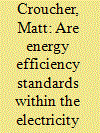

|
|
|
|
|
| Publication |
2011.
|
| Summary/Abstract |
There is a growing trend to introduce energy efficiency standards at the state level. We examine why electricity utilities may be in favor of such a standard and conclude that energy efficiency standards may be a form of regulatory capture.
|
|
|
|
|
|
|
|
|
|
|
|
|
|
|
|
| 2 |
ID:
182595
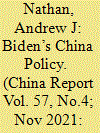

|
|
|
|
|
| Summary/Abstract |
The Biden Administration has accepted the Trump Administration’s definition of China as a ‘strategic competitor’, and has retained Trump’s tariffs, the ‘Quad’, and the upgrade in Taiwan’s protocol status. But Biden’s China policy is different from Trump’s in being truly strategic. The key elements of that strategy are focused on improving the United States’ competitiveness domestically and in international affairs; cooperation with allies and partners; an emphasis on human rights; partial decoupling of economic and technology relationships; and a search for some areas of cooperation with China. Success for the Biden strategy would consist neither of bottling up China in its current global power position nor in achieving a negotiated condominium in Asia. The Biden Administration would succeed if the United States can maintain its alliance system, keep a robust military presence in East Asia and prevent the forcible integration of Taiwan into China while avoiding major war. Several features of the China challenge make it reasonable to hope that such success is possible.
|
|
|
|
|
|
|
|
|
|
|
|
|
|
|
|
| 3 |
ID:
189938
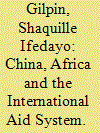

|
|
|
|
|
| Summary/Abstract |
The China–Africa relationship has received increased interest over the past few decades as scholars critically examine the challenge that China, in its quest for a closer strategic partnership with Africa, poses to the norms governing the neoliberal world order (NLWO). One crucial aspect of this is international aid, and how Chinese aid to Africa differs from Western aid. This paper argues that Chinese aid reduces the power of traditional aid donors to shape the development route of African countries. This new development finance ultimately breaks the monopoly of Western aid to decide how poor countries in the global ‘South’ develop. In doing so, the Sino–African aid relationship is challenging the current world order as it offers African states the possibility to decouple (or delink) themselves from the global economy. By challenging assumed neoliberal economic development fundamentals, this relationship, if harnessed correctly by African leaders, can pose longer-term ideological questions around the very set of ideas that underpin development itself, while enabling African states the policy space needed to pursue more sustainable development from an Afro-centric perspective. It is this possibility to delink, due to changing ideological fundamentals concerning economic development, that is the challenge China and Africa pose to the NLWO.
|
|
|
|
|
|
|
|
|
|
|
|
|
|
|
|
| 4 |
ID:
091534
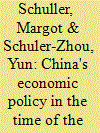

|
|
|
|
|
| Publication |
2009.
|
| Summary/Abstract |
This contribution analyses the impact of the global financial crisis on the Chinese economy and the policies implemented by the Chinese government to cope with it. We argue, first, that China has not been able to decouple its economic performane from that of the U.S. and other developed countries.
|
|
|
|
|
|
|
|
|
|
|
|
|
|
|
|
| 5 |
ID:
114939
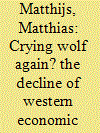

|
|
|
|
|
| Publication |
2012.
|
| Summary/Abstract |
Since the turn of the millennium, scholars and pundits have been musing over the decline of the West. The disappointing US military invasions in Afghanistan and Iraq, together with the subprime mortgage crisis, seem to be evidence of an abrupt end to America's 'unipolar' moment. In Europe, the sovereign debt crisis has amplified Europe's long-term structural economic problems and laid bare the fragile institutional foundation on which the Economic and Monetary Union was built. At the same time, the BRICs and other emerging economies have been growing at unprecedented rates. Those same analysts see a 'decoupling' in the world economy: the developing economies pulling the world out of recession, while the advanced industrial economies are unable to solve their domestic difficulties. So to them, the events of the past five years signify the beginning of the end of Western influence, eventually leading to a more complete rebalancing of the world economy's current 'Western' system of governance. This article argues instead that the West still has a significant edge when it comes to most critical factors that determine long-term economic growth potential, including technology, innovative capacity, research and development, investment climate and education. Furthermore, the transatlantic economy is less vulnerable than the rest of the world to outside economic shocks and might eventually prove more capable of reform than many expect. The current malaise in the transatlantic community might therefore prove once again to be more cyclical than structural. Relying on linear projections, many are 'crying wolf' again, too loud and too soon.
|
|
|
|
|
|
|
|
|
|
|
|
|
|
|
|
| 6 |
ID:
088980


|
|
|
|
|
| Publication |
2009.
|
| Summary/Abstract |
Applying the techniques of decomposition analysis we estimate the relative contribution of ten variables (termed 'key ratios') plus GDP to the change in UK road freight energy use over the period 1989-2004 inclusive. The results are best interpreted as an estimate of the percentage growth in energy consumption that would have resulted from the change in the relevant factor (e.g. length of haul) had the other factors remained unchanged. The results demonstrate that the main factor contributing to the decoupling of UK road freight energy consumption from GDP was the decline in the value of domestically manufactured goods relative to GDP. Over the period 1989-2004 this largely offset the effect of increases in GDP on road freight energy consumption. While the decline in domestic manufacturing was to some extent displaced by increases in imports, the net effect of these supply factors, together with shifts in the commodity mix, has been to reduce UK road freight energy consumption by 30.1%. The net effect on global carbon dioxide (CO2) emissions is likely to be somewhat less beneficial, since many freight movements associated with the manufacture of imported goods have simply been displaced to other countries.
|
|
|
|
|
|
|
|
|
|
|
|
|
|
|
|
| 7 |
ID:
168333


|
|
|
|
|
| Summary/Abstract |
Public utilities and regulators are implementing various forms of regulatory mechanisms that decouple revenues from commodity sales to remove a disincentive or create an incentive for utilities to invest in and encourage consumers to conserve electricity, natural gas and water. A major question is whether such regulatory mechanisms affect investor-perceived risk, the cost of common equity and the utility rates of such commodities. This is an important question as regulators in the US are and have been considering the impact of decoupling on investment risk and therefore the cost of common equity in rate proceedings. This matter is also important for regulators globally as they consider decoupling as a policy initiative in setting rates and rate of return. Currently, decoupling is primarily a US ratemaking policy for energy and water utilities as are price caps in Europe. Empirical testing, based on the available data in the US, consistently demonstrates that decoupling has no statistically measurable impact on risk and the cost of common equity. Therefore, at this juncture, policy is moving ahead, at least in the US, without empirical evidence on whether it does have impact on risk and return.
|
|
|
|
|
|
|
|
|
|
|
|
|
|
|
|
| 8 |
ID:
111318


|
|
|
|
|
| Publication |
2012.
|
| Summary/Abstract |
Between 1989 and 2004, energy consumption for road freight in the UK is estimated to have increased by only 6.3%. Over the same period, UK GDP increased by 43.3%, implying that the aggregate energy intensity of UK road freight fell by 25.8%. During this period, therefore, the UK achieved relative but not absolute decoupling of road freight energy consumption from GDP. Other measures of road freight activity, such as tonnes lifted, tonnes moved, loaded distance travelled and total distance travelled also increased much slower than GDP. The main factor contributing to the observed decoupling was the declining value of manufactured goods relative to GDP. Reductions in the average payload weight, the amount of empty running and the fuel use per vehicle kilometre also appear to have made a contribution, while other factors have acted to increase aggregate energy intensity. The results demonstrate that the UK has been more successful than most EU countries in decoupling the environmental impacts of road freight transport from GDP. However, this is largely the unintended outcome of various economic trends rather than the deliberate result of policy.
|
|
|
|
|
|
|
|
|
|
|
|
|
|
|
|
| 9 |
ID:
160348
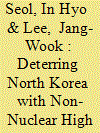

|
|
|
|
|
| Summary/Abstract |
The Republic of Korea (ROK) Ministry of National Defense (MND) should
support and guarantee the process of peaceful and diplomatic denuclearization
by providing a perfect deterrence posture that can cope with any contingencies,
while being especially cautious so as not to ignite political tensions. For that
purpose, strengthening the ROK’s own deterrence capability against the North
Korean military threat is becoming more and more important. This is especially
true because the North Korean ICBM capability, which is assessed to be completed
in a short time, is believed to be able to pose the so-called “decoupling situation”
on the Peninsula, by an increasing number of people. Although it is not certain
the decoupling may really happen even if the North does finally achieve ICBM
capability, this is a problem that cannot be ignored, since more and more people are
worrying about it. Several non-nuclear high-tech weapon systems and masterful
tactics to apply them in the Korean situation raise the possibility of dramatically
strengthening the overall deterrence posture against North Korean threat without
any additional nuclear measures. From now on, the ROK MND should formulate
a new version of the ROK’s own deterrence strategy against the North, the “3K+”
which tries to utilize the new possibilities provided by several conventional hightech
weapons, together with the pre-existing 3K systems (Kill Chain, KAMD, and
KMPR). The new strategy should be built more systematically to overwhelm any
possible North Korean military ambitions in advance, defeating any and all military
capabilities that the North is expected to strive for in the future. As Sun Tzu taught,
the highest strategy can frustrate the enemy into surrendering, even without a fight.
|
|
|
|
|
|
|
|
|
|
|
|
|
|
|
|
| 10 |
ID:
188454
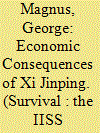

|
|
|
|
|
| Summary/Abstract |
In the aftermath of the 20th National Congress of the Chinese Communist Party, Xi Jinping’s principal focus will be on state and national security, while an entirely new economic- and financial-policy team, with little experience, will take charge of China’s troubled economy. Its members will have to manage several systemic problems – a debt mountain, a property bust, a rapidly ageing population, zero-COVID policies – and develop a viable new economic-development model. This would be a demanding agenda anywhere, but Xi’s China has to tackle it guided by an ever more devoutly Leninist approach to economic management, industrial policy and governance, at a time when China faces the most hostile external environment it has known since Mao Zedong, as exemplified by foreign decoupling. Although Xi’s China is capable of important accomplishments in science and technology, and of flexing its diplomatic and military muscles in defence of its interests, China’s politics may be much less capable of fixing the country’s systemic economic and financial weaknesses. The consequences of Xi Jinping’s economic programme, including an emphasis on self-reliance, promise to extend beyond China’s borders to foreign actors and countries that once benefited from its economic rise.
|
|
|
|
|
|
|
|
|
|
|
|
|
|
|
|
| 11 |
ID:
112268


|
|
|
|
|
| Publication |
2012.
|
| Summary/Abstract |
We adopted the refined Laspeyres index approach to explore the impacts of industry scale, energy mix, energy intensity and utility mix on the total carbon dioxide emissions from the Chinese nonferrous metals industry for the period 1996-2008. In addition, we calculated the trend of decoupling effects in nonferrous metals industry in China by presenting a theoretical framework for decoupling. As the results suggest, Chinese nonferrous metals industry has gone through four decoupling stages: strong negative decoupling stage (1996-1998), weak decoupling stage (1999-2000), expensive negative decoupling stage (2001-2003) and weak decoupling stage (2004-2008). We have analyzed the reasons for each phase. Generally speaking, the rapid growth of the industry is the most important factor responsible for the increase of CO2 emissions, and the change in energy mix was mainly due to the increased proportion of electric energy consumption that has contributed to the increase of CO2 emissions. Reduction of energy intensity has contributed significantly to emissions decrease, and the utility mix effect has also contributed to the emission decrease to some extent.
|
|
|
|
|
|
|
|
|
|
|
|
|
|
|
|
| 12 |
ID:
192535


|
|
|
|
|
| Summary/Abstract |
The idea of weaponised interdependence has led many to believe that Russia would not invade Ukraine due to the high costs of sanctions, including through the Western-backed SWIFT system of financial payments. Although Russia’s economy has been facing shortcomings, the Russian leadership thrived in part due to connections beyond the West. This article argues that scholars have missed the fact that, more than being interdependent with the West, rising states have been decoupling from the United States and the European Union. Emerging powers, particularly China and Russia, have expanded their trade network and built their own financial infrastructure. Those transformations call for a less Western-centric International Relations (IR) scholarship. Scholars should furthermore not only focus on theories of Neoliberal Institutionalism, but also consider contributions from Realism and Marxism to International Political Economy (IPE).
|
|
|
|
|
|
|
|
|
|
|
|
|
|
|
|
| 13 |
ID:
154935
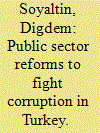

|
|
|
|
|
| Summary/Abstract |
This article examines the practical application of legal reforms to fight corruption in Turkey, focusing on three policy sectors: civil administration, public finance management and public procurement. Facing increasing pressure, incumbent governments have adopted international anti-corruption norms and programs in the last two decades. However, the adoption and adaptation of formal institutions tends to remain decoupled from informal behavioral practices, thereby curbing the effectiveness of Europeanization in the Turkish public sector – albeit to varying degrees. The policy comparison of this article shows that external anti-corruption efforts, especially those initiated by the EU, can help domestic actors to address the problem of decoupling when certain domestic factors are present.
|
|
|
|
|
|
|
|
|
|
|
|
|
|
|
|
| 14 |
ID:
188806
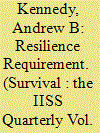

|
|
|
|
|
| Summary/Abstract |
The United States and its partners have arrived at a critical crossroads in their relations with China – and with one another – in the realm of high technology. Some degree of high-tech decoupling between the two sides is already under way, and recent events suggest this trend is accelerating. Combined efforts to bolster their collective resilience in the face of China’s rise remain inadequate. Going forward, much greater investment in resilience is required, including measures to absorb threatening Chinese actions and to adapt and transform in response to China’s growing technological prowess. While this will call for considerable acumen and effort on the part of like-minded governments, greater resilience would afford them renewed solidarity and enriched opportunities to sustain technological leadership in the future.
|
|
|
|
|
|
|
|
|
|
|
|
|
|
|
|
| 15 |
ID:
150732


|
|
|
|
|
| Summary/Abstract |
The goal of this paper is to provide new insights to elucidate the inconclusive results from the Environmental Kuznets Curve (EKC) empirical literature. For the first time in empirical literature, an econometric analysis includes the relative prices for several energy sources. The paper provides strong evidence on the relevance of energy prices to CO2 emissions. Accordingly, one reason for the lack of agreement in the EKC literature may be the absence of energy prices in empirical exercises. The presence of relative energy price changes in the econometric specification confirms a monotonic and positive relationship between CO2 and gross domestic product (GDP). Therefore, we may conclude that there is a decoupling process but without reaching any turning point on that relationship. The policy implications are straightforward. Direct climate action by policy makers is required to break the positive relationship between CO2 and GDP. That conclusion has been reinforced by the reduction of energy prices since the middle of 2014. Otherwise, the trend in energy prices may reverse the relative decarbonisation processes accounted for in recent years in major developed countries.
|
|
|
|
|
|
|
|
|
|
|
|
|
|
|
|
| 16 |
ID:
186106
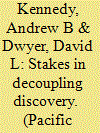

|
|
|
|
|
| Summary/Abstract |
Technological innovation has emerged as an important site of globalization in recent decades. Yet it is unclear what the future holds for this new form of collaboration, given the spectre of high-tech “decoupling” between the United States and China. This article explores the role that China has come to play in transnational innovation linkages, in an effort to ascertain what is at stake. We find that China has become a key player in some respects, while in others it remains relatively marginal. Moreover, we find that in the arenas where China is most prominent – as a player in brain circulation and as a partner in basic science – China’s participation has had important benefits for other countries, particularly the United States.
|
|
|
|
|
|
|
|
|
|
|
|
|
|
|
|
| 17 |
ID:
192820
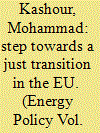

|
|
|
|
|
| Summary/Abstract |
The conceptual and regulatory framework of the European just transition does not consider inequality in household energy consumption. This study addresses the causes of this inequality across the 27 Member States of the European Union (EU) in the period 2010–2020 to contribute to its reduction. To identify these causes, the regression-based inequality decomposition approach is used. The results show that the variation in per capita gross domestic product (GDP), which contributes 38.76% to the inequality of household energy consumption, is the main cause of this inequality. Moreover, the average contribution of GDP per capita in the inequality of household energy consumption is almost negligible in the most developed states. In contrast, it is much higher in the least developed states, suggesting that decoupling between household energy consumption and economic development has not been achieved in all Member States. To promote a just transition to climate neutrality by 2050, the energy transition framework should therefore be broadened to help the least developed states achieve decoupling and align their energy consumption with that of the most developed states.
|
|
|
|
|
|
|
|
|
|
|
|
|
|
|
|
| 18 |
ID:
176584


|
|
|
|
|
| Summary/Abstract |
The decoupling policies enforced by the Trump Administration aim to break the US economic relationship with China. Those policies, however, are escalating strategic costs for the US in at least three unanticipated ways: the decoupling policies are losing the endorsement of US multinational corporations, undermining the solidarity of the US and its allies, and making supply chains more likely to disengage from the US than to disengage from China. We argue that the ongoing decoupling policies are costing more than the US can bear and will end in vain. If the Trump Administration enforces further decoupling policies without considering those implicit costs, it will only set the US up for a more expensive failure.
|
|
|
|
|
|
|
|
|
|
|
|
|
|
|
|
|
|
|
|
|